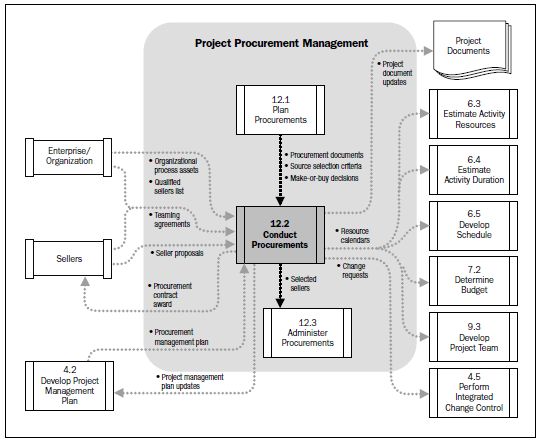Project Procurement Management
Project Procurement Management is one of the nine knowledge areas in PMBOK (Project Management Body of Knowledge). Project procurement management is important for all project managers today. It could help us in managing vendors and keep good relationship between vendors and suppliers. Project Procurement Management is process of purchasing or acquiring products, services or results needed from outside the project team. It includes the contract management and change control processes. Project procurement management involves planning, acquiring products or services, choosing sources, administering the contract and closing contract. It can be applied to internal work orders, formal agreements, or contract between organization units within single entity.
Project Manager (PM) plays important roles in procurement process. He has to make sure that procurements meet the project needs while following the organizational procurement policies. PM must be involved in the creation of contracts as he should know the procurement process, understand the contract terms and conditions, make sure the contract contains all project management requirements, identify risks and incorporate mitigation and allocation of risks into contract, involve in contract negotiation, make sure procurement process done smoothly and so on. PM team may get need from specialists in contracting, purchasing, law and technical disciplines.
The organization can be either the buyer or seller of products or services. The buyer that is acquiring the project form performing organization (the seller) and administering. The seller will typically manage the work as a project if the acquisition is not just shelf material, goods, or common products.
The processes in procurement management are:
- Plan Procurements
- Conduct Procurements
- Administer Procurements
- Close Procurements
Figure 1 Project Procurement Management Data Flow Diagram
Plan procurement is a process of documenting project purchasing decisions, specifying the approach, and identifying potential sellers. It identifies project needs that must be met by acquiring products or services versus the project needs that can be accomplished by project team. It includes consideration of potential sellers and people who responsible for holding permits or professional licenses required by regulations.
Conduct procurement is a process of obtaining seller response, selecting seller and awarding a contract. The team will receive bids or proposals and apply defined selection criteria to select the qualified sellers to perform the work.
Administer procurement is a process of managing procurement relationships, monitoring contract performance, and making changes and correction as needed. It ensures that seller’s performance meets the procurement requirements and buyer performs according to terms of legal contract.
Close procurement is a process of completing each of project procurement. It involves verification that all work and deliverables were acceptable.



